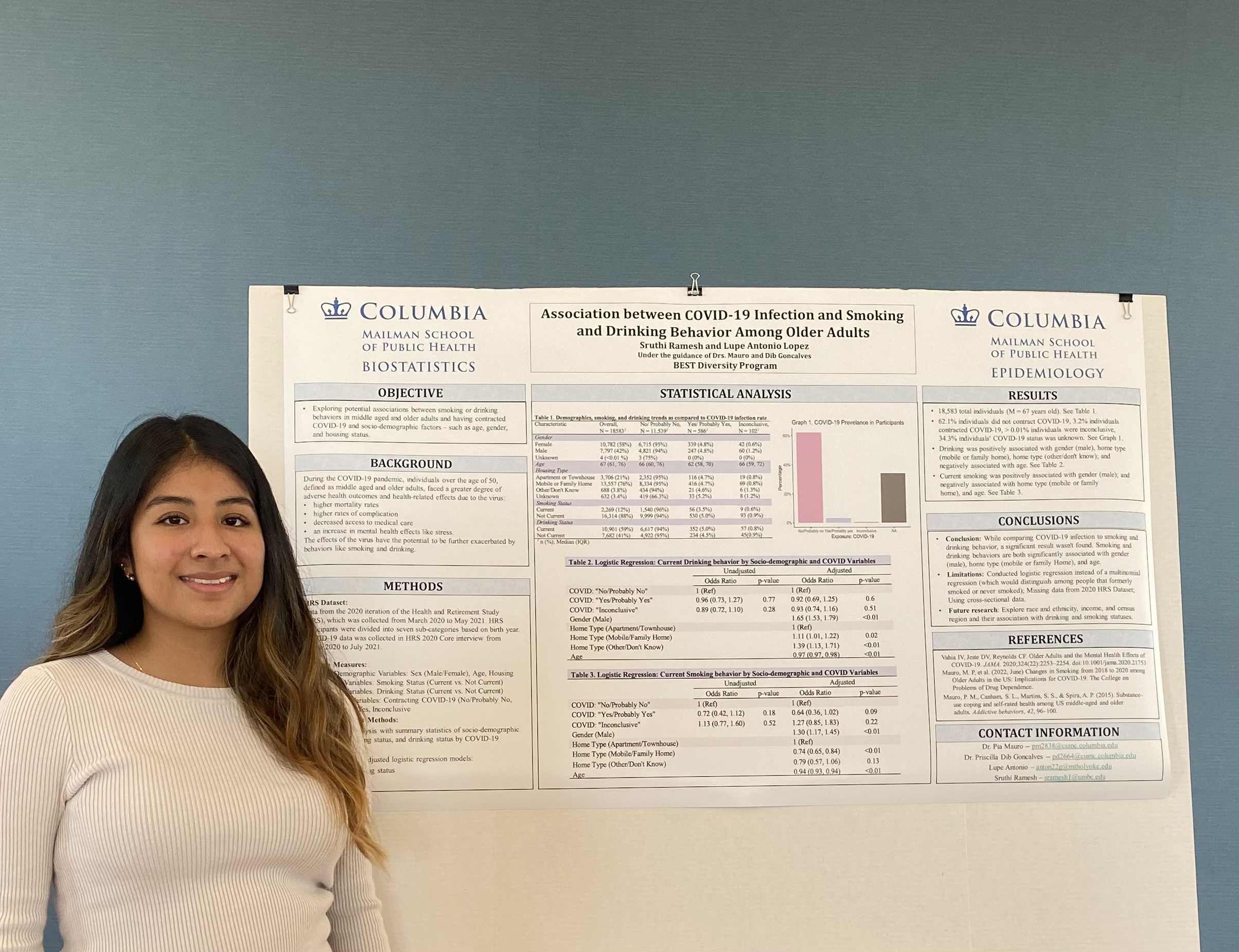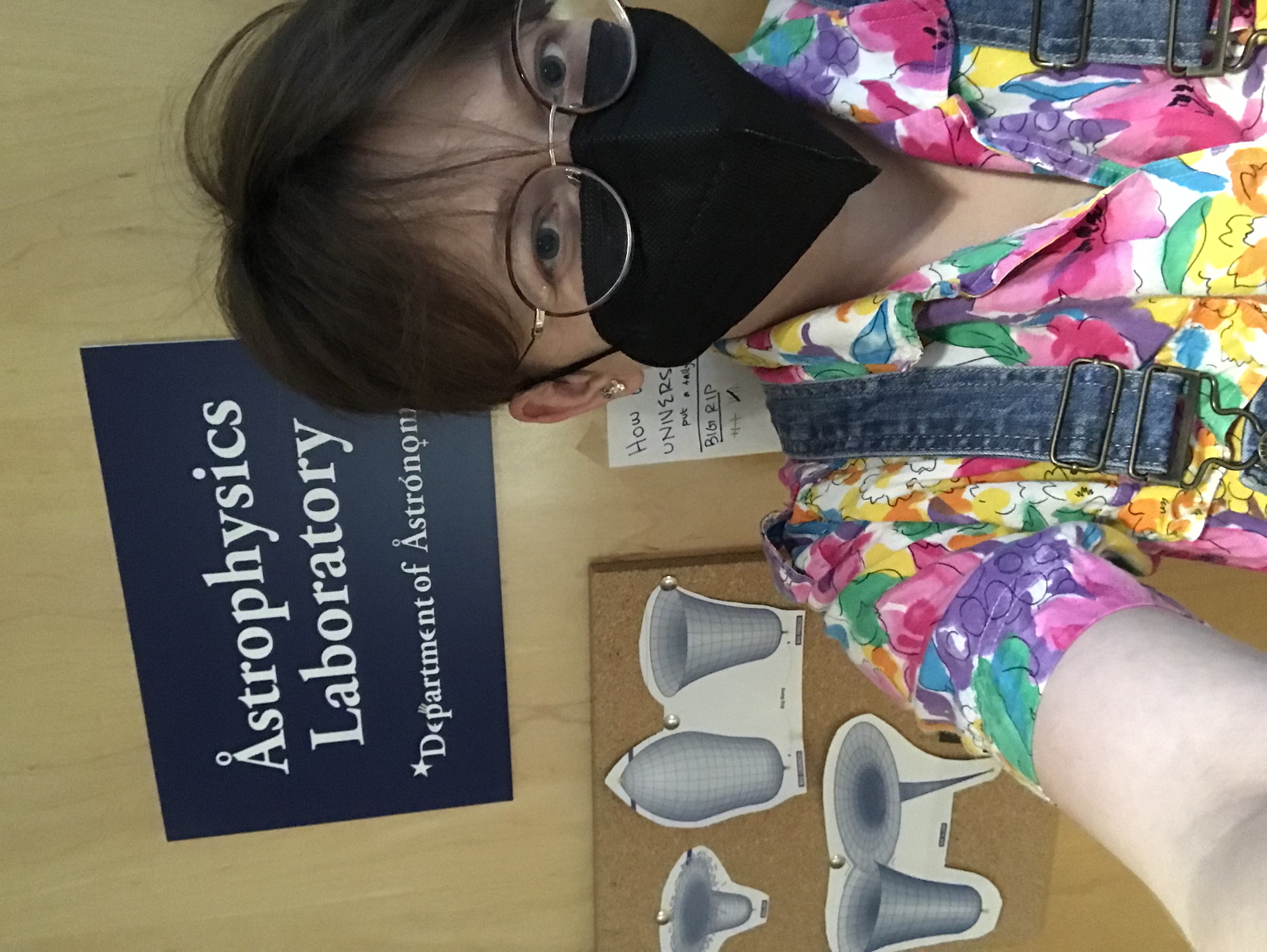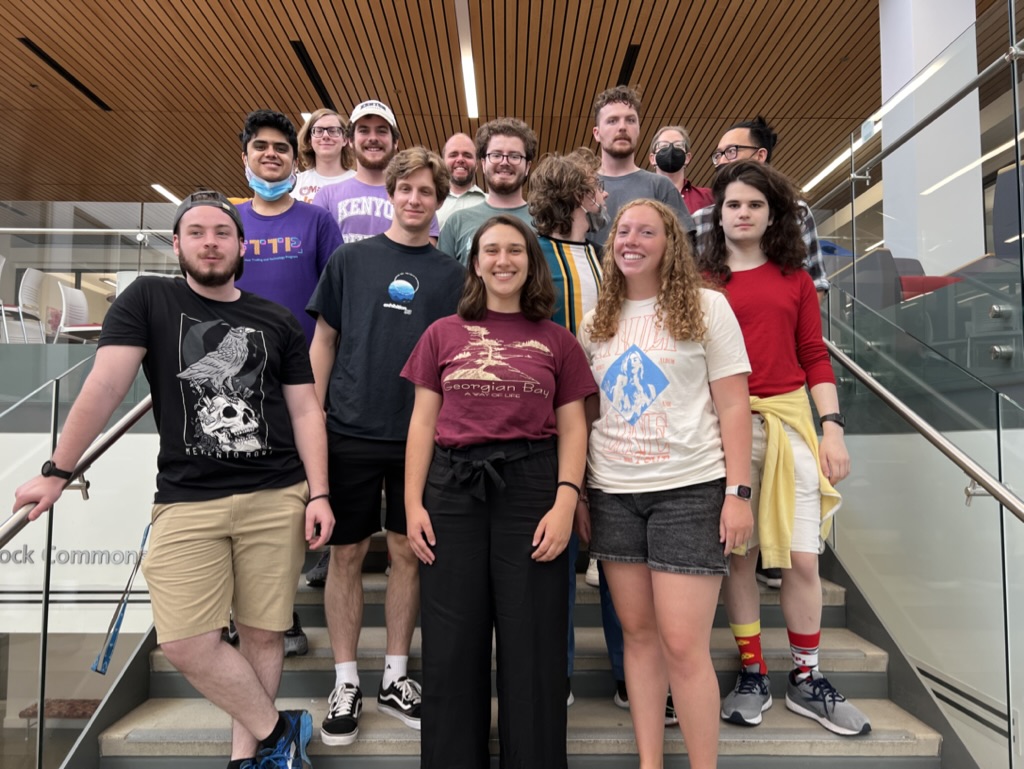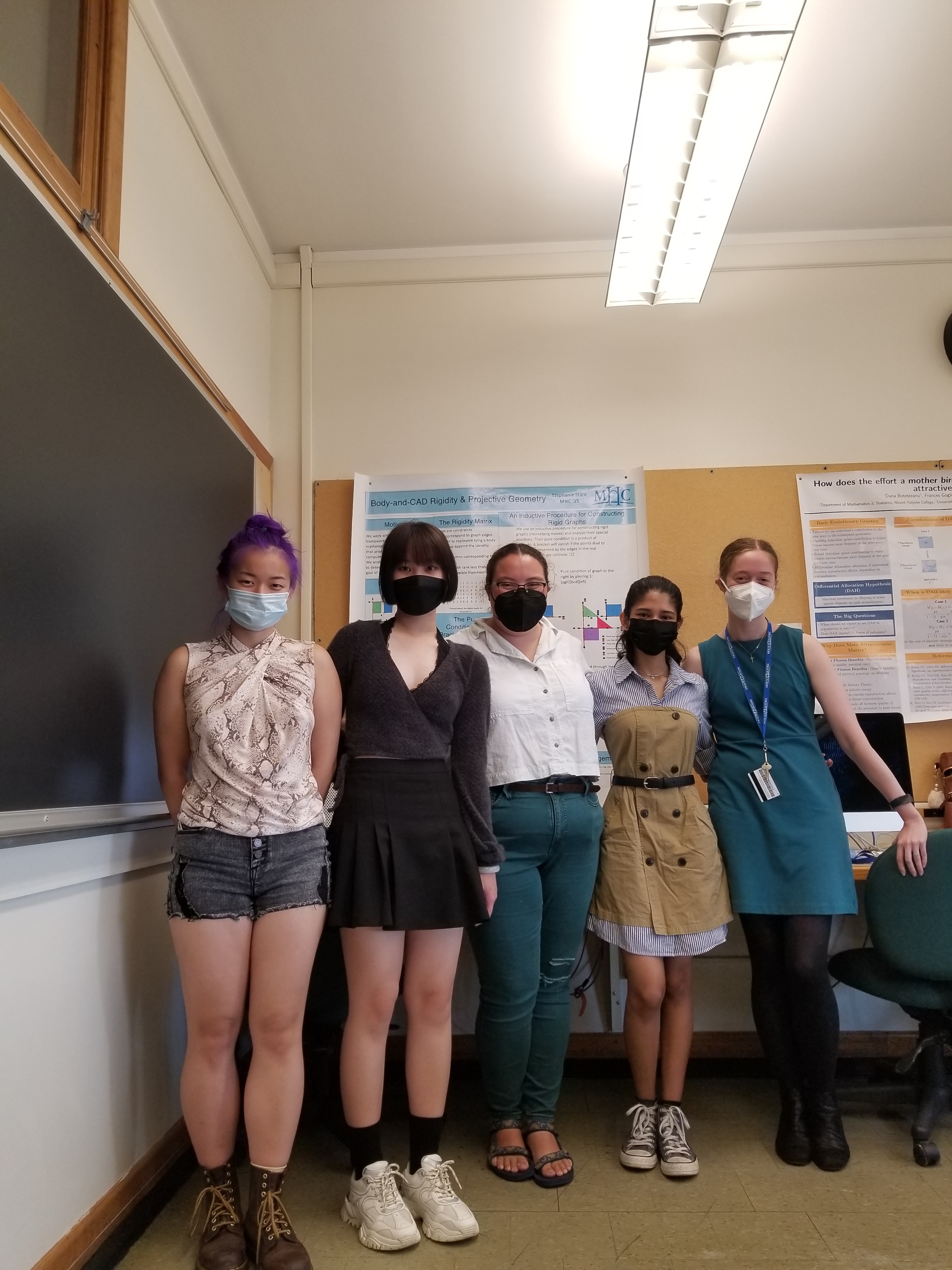Math/Stat/DS student summers
Each summer Mount Holyoke math/stat/ds students are involved in a variety of activities. Over summer 2022, students participated in research and internships at academic institutions, government agencies, and in industry. The department is proud of the diversity of interests and everyone’s accomplishments.
A survey was sent asking majors, minors, and members of the math/stat/ds club to let us know about the programs they participated and to pass on any advice to students looking for things to do in future summers. Their responses are recorded below.
Lupe Antonio ’23 participated in the BEST (Biostatistics Epidemiology Summer Training) Program at Columbia University Mailman School of Public Health.
I worked alongside Dr. Mauro, her Post-Doc, and a fellow BEST peer on an Epidemiology project focused on COVID-19 and older adults. This project involved lots R applications as well as topics learned in the Infectious Disease Modeling course at MHC. The program also consisted of taking two courses, Introduction to Biostatistics and Introduction to R. Additionally, the program included a variety of seminars hosted by professionals; and professional development talks on topics like navigating the mentor relationship, how to effectively present research, applying to graduate school, and more. This program provided me with amazing connections to professors and professionals at Mailman, like my mentor Dr. Mauro and the PhD students that served as our professors for the summer courses. Working alongside a diverse and supportive group of students, PhD students/professors, and mentors allowed me to confirm that I would like to pursue graduate school in Biostatistics.
Advice: Don’t be afraid to apply to multiple programs, especially those that you feel like are out of your reach! Additionally, if you are interested in biostatistics or epidemiology I would highly encourage you to considered applying to the BEST program at Mailman. You’ll meet wonderful people from a variety of schools around the country and build wonderful friendships and connections, especially since you are taking classes, working on projects and homeworks, and exploring New York City together.
Caroline Arnold ’24 worked as an instructor for iD Tech, a tech camp hosted at Macalester College.
I taught classes in Java and JavaScript, plus some Roblox Studio courses geared toward younger students.
Midge Hartshorn ’24 participated in the Five College Astronomy Department Undergraduate Internship Program, hosted at UMass Amherst.
My project was focused on estimating the fractal dimension of star-forming regions in galaxies using a Fourier transform technique applied to images taken by the Hubble Space Telescope. It was really exciting to have a project that combined my interests in both math and astronomy, as well as a fair amount of programming. I was able to apply skills and content I learned from (nearly) every math course I’ve taken at Mount Holyoke directly to this project.
Advice: I knew that I wanted to do some sort of summer research this year, so I started reaching out to faculty early. Due to family commitments, I knew I wouldn’t be able to leave the Pioneer Valley, so the faculty here were instrumental in identifying local opportunities that I might not have been aware of otherwise.
Zoe Hellman ’23 worked as a market research intern for a consulting company, RSG inc, which specializes in the transportation industry.
I spent the first few weeks of my internship working in NYC Port Authority Bus Terminal on a survey field. For the rest of the summer I worked remotely and was involved in various ways on multiple projects (such as data cleaning, meeting with clients, various kinda of analysis, writing a paper, and more). I felt that the Math and Statistics classes at Mount Holyoke really prepared for me this internship, I used R everyday and had an easier time understanding the models used by team (even those I hadn’t heard of before). Overall I enjoyed working in market research, I was able to challenge and improve my coding abilities everyday but was also able to work creatively by problem solving and creating deliverables for clients. I will definitely be looking at Market Research positions as I job search this year.
Advice: I applied to many (many!) applications throughout the school year. During my interview I showed enthusiasm and knowledge about the company (I had done some research before hand). There were no technical questions (such as live coding) in my interview, however I was asked about previous projects and experience using quantitative methods. For these questions I went into as much detail as possible about any applications and methods that I have used (such as when and why I used a certain method). My mentors gave me feedback that these points stood out during my interview.
Willow Kelleigh ’24 interned at The Learning Partnership.
I did an internship at an education research company with lynk funding. I created onboarding exercises for ArcGIS and CODAP, and did some summary statistics and regression analysis on pre and post activity survey data.
Advice: In general, reach out to people personally via email instead of relying on applying to advertised positions, especially if you have lynk funding.
Arianna Koch ’23 participated in the Central Convergence REU at Central Washington University.
I studied Utility Theory within a group of 4 under the mentorship of Dr. Sooie-Hoe Loke. I worked with computer mouse tracking data and improved upon a prediction model for online gambles. I gained experience doing data science work in R and Python. This model built off research done in Psychology and applied statistical principles to refine how many participants would take gambles under different conditions.
Advice: When I worked with the CCREU, there were two projects dealing with applied math/statistics and one dealing with theoretical math. This can be a good choice for someone not sure which branch of mathematics to consider, but if you have your mind set on one, then apply to a program dealing with that branch exclusively. This program also gave a lot of opportunity for individual work, which was helpful for students who want to take initiative.
Hannah O’Grady ’23 worked at the MHC restoration ecology lab and attended a bioinformatics REU at BU.
For the first half of the summer I did field work on restored cranberry bogs with the MHC restoration ecology lab and for the second half of the summer I attended a bioinformatics REU at BU. The project I was working on used manifold reconstruction to predict nonlinear growth in tropical rainforests for applications in conservation and management. This opportunity helped me decide how much quantitative biology I want my future to include and what blend of my two majors (stats and bio) I want to pursue moving forward.
A good understanding of data science and programming was very helpful for this program.
Oishika Saha ’24 was a reunion worker and did summer research at MHC.
During the month of May, I worked as a Reunion Worker on campus where I did housekeeping, dining, and waitstaff jobs. Soon after, my Summer Research began for the next 8 weeks with the Statistics department where I did analysis on Renaissance Mass Music. After the 8 weeks, I returned home for the remainder of the summer vacation.
My summer research helped me develop my research skills and become more able to do independent work. I am a Data Science major so this project allowed me to experience my first practical application of the theories I learnt in my classes.
Advice: This was my first time doing this sort of work. I was extremely nervous and anxious about whether I would be able to produce any output after the 8 weeks. It was also the reason why I chose to do a summer research on campus within a setting I was familiar with instead of an internship at a larger cooperation or a different university. If you are like me, a person who was not confident in my skills and abilities, then I advise you to try working on a project with the professors on campus as a starting point to boost your morale and confidence. It most certainly did for me!
Syeeda Nafia Subah ’23 worked as an operations analytics intern at Highmark Health.
Highmark Health is a national blended health organization and it’s leading companies cover a diversified spectrum of essential health-related needs including health insurance, health care delivery, population health management, dental solutions, reinsurance solutions, and innovative, technology solutions.
Some of the projects I worked on during this internship involved building a R Shiny dashboard for opioid prescription rates for lower back pain. The dashboard had a reactive data table on top which allowed you to search for key words or filter columns, and interactive data visualizations at the bottom. I also contributed by creating and analyzing surveys on “Qualtrics” for internal teams. Another project I worked on involved analyzing the results of a “Member Engagement Guide, PCP” campaign where we hypothesized that members who were able to be reached via phone call were more likely to schedule a PCP visit within the 6 month post-outreach period than members who were not able to be reached via phone call. I further contributed by building the company’s Tableau, Alteryx and SAS microsite based off of their old Sharepoint sites. Lastly, since the company is aiming to shift towards using RStudio solely, I helped in code conversions of several programs (Dental Gap Program, Colorectal Cancer Program) from SAS to R.
I am a senior, double majoring in Statistics and Economics, and pursuing a certificate in Cultural Health & Sciences. I am passionate about data analysis in the health field and the work I did with Highmark this summer is exactly the kind of work I aim/hope to do in the future.
Advice: Being an international student, it is definitely not an easy task to land summer internships. And, the application process itself can be difficult/draining. Some people say that networking is the key, some say that having a great cover letter is the answer and some also say that you must have a great GPA or good prior experiences. But it has a lot to do with luck as well!
I found out that it wasn’t solely one thing that worked for me. I realized that rejection is part of the process . Just make sure you try your best so you do not have any regrets from your end.
Also, even though you have a very clear idea of what kind of work you want to be doing, don’t just limit yourself to that. Make sure that your interviewers know that you are excited to learn new things!
Laura Thornburg ’23 did an REU at University of Wisconsin Madison.
I worked on a project investigating Fourier Restriction of oscillating curves with Alpha-Hölder continuity. We were looking for a range on \(p\) and \(q\) such that the norm of the transform of the original function was unbounded. We did find a bound! I worked in a group of 4 + 2 graduate students (one of whom was leading the project) for 5 weeks and on the last day we presented our poster to the other project groups in the program. The program is related to my major because I’m considering graduate school for math and I wanted to get a taste of what math research actually looks like day-to-day. I found that and I was able to talk to professors, graduate students and 1 post-grad about their career/education path.
I would recommend taking real analysis earlier than I did because it pops up in research a lot!
Karry Wang ’23 did summer research at MHC.
I did an REU with Professor Mrad at MHC. It works on trapping mosquito. We mainly worked on building a system of program by python to track real maps to excel data.
Susan Wang ’23 participated in the Summer@ICERM 2022: Computational Combinatorics math research program at Brown University.
In this program, my teammates and I explored subsets of parking functions and unit interval parking functions by giving certain restrictions on statistics such as ascents, descents, and ties. This research is motivated by two previous studies: 1) in 2013, Billey et al. investigated in permutations given certain peak sets; 2) in 2018, Schumacher enumerated parking functions with k descents and i ties. Our research extended both of the studies to look at ascent/descent/tie sets and subsets in parking functions and unit interval parking functions. In the end, we finished a report on unit interval parking functions and gave a 50-min presentations about our findings. We are still continuing to work weekly to complete another paper and to edit for our papers to be published. We will also present a poster regarding our research this summer at the Joint Mathematics Meetings 2023 in January in Boston.
In this program, I got to meet our amazing organizers, TAs, and 17 other math “cousins”. I learned a lot through this program, not only academic knowledge regarding parking functions (which I have no knowledge of coming in), but also useful skills about how to create CVs and personal websites. This program taught me more on how to do math research and helped me practice my writing skills and also presentation skills. Also, I have a clearer goal of what I want to do as I am applying to grad school. I believe that the skills and knowledge I learned and the networks I have built through this experience will help me with my last year here and my grad school applications as well.
Advice: For future math REU applicants: 1) Start early to apply. Generally, the deadlines for REUs are at the end of February or at the beginning of March. (With that being said, ask early for recommendation letters, like at least 3 weeks before the due date.) 2) I choose to do a math REU program to explore more areas of study in math and also to see if I would like to keep doing math research going into grad school. I think I got a clearer answer after this program. Those are important motivations for REU programs and I think don’t be afraid to apply, even if no previous research experiences. 3) A lot of the REUs are funded by NSF, which means that they usually don’t accept international students. However, it’s worth emailing the institution to see if they accept Lynk funding. I got an offer from University of North Carolina this year (although chose to go to the ICERM) saying that I can bring Lynk funding to do research there.
For applicants specifically interested in the ICERM program: 1) Strongly recommend! 2) It’s also a program that requires a lot of commitments and intense for 8 weeks. Generally, the requirements is 40 hours every week, however I think everyone of us this year extended that amount of hours.
3) It’s a program that provide fundings for international students.
Jenny Xu ’23 did an REU at SMU in Dallas, Texas.
Our group worked on analyzing the eviction data collected from court.






